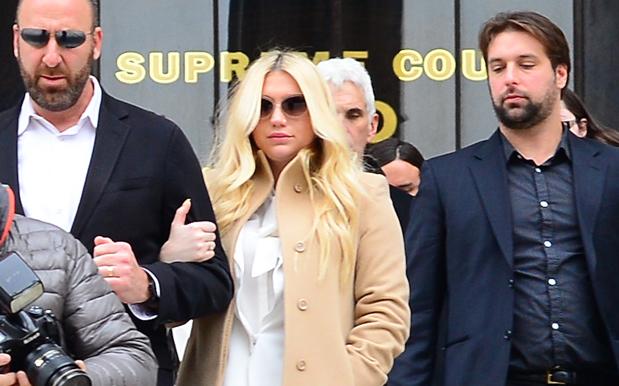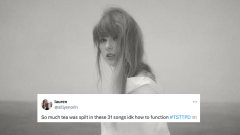
WARNING: This post discusses sexual abuse and domestic violence.
Lena Dunham, in her own words, “is mad as hell” about the outcome of Kesha and Dr Luke‘s court case, and has penned an essay for her feminist newsletter Lenny that unpacks the sickening nature of the case, and its implication in the wider conversation about abuse, domestic violence, and the many, many barriers to reporting sexual assault.
If you’ve missed the story so far, Kesha lost a court case last Friday to break her contract with producer Lukasz Gottwald, a.k.a. Dr Luke, the man whom she alleges has abused, drugged, and sexually assaulted her over a ten year period.
I didn’t rape Kesha and I have never had sex with her. Kesha and I were friends for many years and she was like my little sister.
— Dr. Luke Doctor Luke (@TheDoctorLuke) February 22, 2016
I have 3 sisters, a daughter, and a son with my girlfriend, and a feminist mom who raised me right.
— Dr. Luke Doctor Luke (@TheDoctorLuke) February 22, 2016
(Just to be clear here: Dr Luke has never been found guilty of sexual assault, and there’s a great piece over on Jezebel detailing the history of him and Kesha. Yet the ‘I know women so therefore I couldn’t possibly assault them’ is the flimsy nothing defence that all-too-frequently gets marched out whenever a man finds themselves at the negative end of sexual assault / abuse / misogyny claims.)
“To be clear, Kesha’s case is about more than a pop star fighting for her freedom, or a $60 million investment in a shiny commercial career. It’s about more than whether Kesha can strap on her cool leotards and make another album, free from a man who she says terrifies her. It’s even about more than the systemic misogyny of the entertainment industry, or the way that women in music and film have long been controlled and coerced by abusive Svengalis and entities larger than themselves. (Think: the studio system of the ’40s and ’50s, when starlets were essentially chattel. Think: Ike and Tina Turner.) What’s happening to Kesha highlights the way that the American legal system continues to hurt women by failing to protect them from the men they identify as their abusers.
“For example: 19 states in America still allow rapists to assert parental rights over children conceived through rape, yoking women (and their children) to their attackers for a lifetime, an unimaginable cycle of revictimisation. But it’s real. The same man who violently assaulted you could get the right to cuddle the baby that resulted from that assault.
“A huge part of Kesha’s argument rests on her lawyer’s assertion that Gottwald, potentially enraged by Kesha’s sexual-assault allegations, could make efforts to bury her subsequent albums, preventing her from publicising and therefore profiting from her work. This kind of control is a cornerstone of domestic abuse, and it’s far too common: according to the National Network to End Domestic Violence, financial abuse is an aspect of approximately 98 percent of abusive relationships. When a woman is not in control of her financial destiny, either because her partner is the primary breadwinner or because he makes financial decisions for the entire family, her world is made minuscule. Her resources evaporate. Fear dominates.
“That’s not the only way legal ties can make it impossible for a woman to escape her abuser. Someone I love very much has been engaged in a years-long battle to allow her and her young daughter to move closer to where her successful business is (and away from her abuser). If he can’t control her directly, he will attempt to make sure that her choices are actually his. In some cases, victims of domestic violence can even be evicted from their homes for calling the police on their abusers. Yup, there are laws that allow landlords to kick tenants out if the cops are summoned for disorderly conduct of any kind — doesn’t matter who the “disorderly” one was — and this affects poor women most frequently. It’s why 20 percent of homeless women say they are on the streets because of domestic violence.
“These women deserve better. They do not choose to have their reputations pilloried and their characters questioned as a tactic for getting what they want. What if we realise that the women who come forward have everything to lose, whether they’re pop stars or single mothers?
“The fact is, Kesha will never have a doctor’s note. She will never have a videotape that shows us that Gottwald threatened and shamed her, and she will never be able to prove, beyond the power of her testimony, that she is unsafe doing business with this man. And no, none of this was in her contract. But what man, what company endeavours to keep a woman saddled with someone who she says has caused her years of trauma, shame, and fear? Fighting this fight publicly and in the legal system has already changed the course and tenor of her career forever. The lack of perspective on the part of Sony — the inability to look at the worth of a woman’s platinum records versus the worth of her soul being intact — is horrifying.”
Read her entire piece here: http://www.lennyletter.com/politics/a275/why-keshas-case-is-about-more-than-kesha/
If this post has been triggering, please give 1800 RESPECT a call on 1800 737 732.
Source: Lenny.
Photo: Raymond Hall / Getty.







